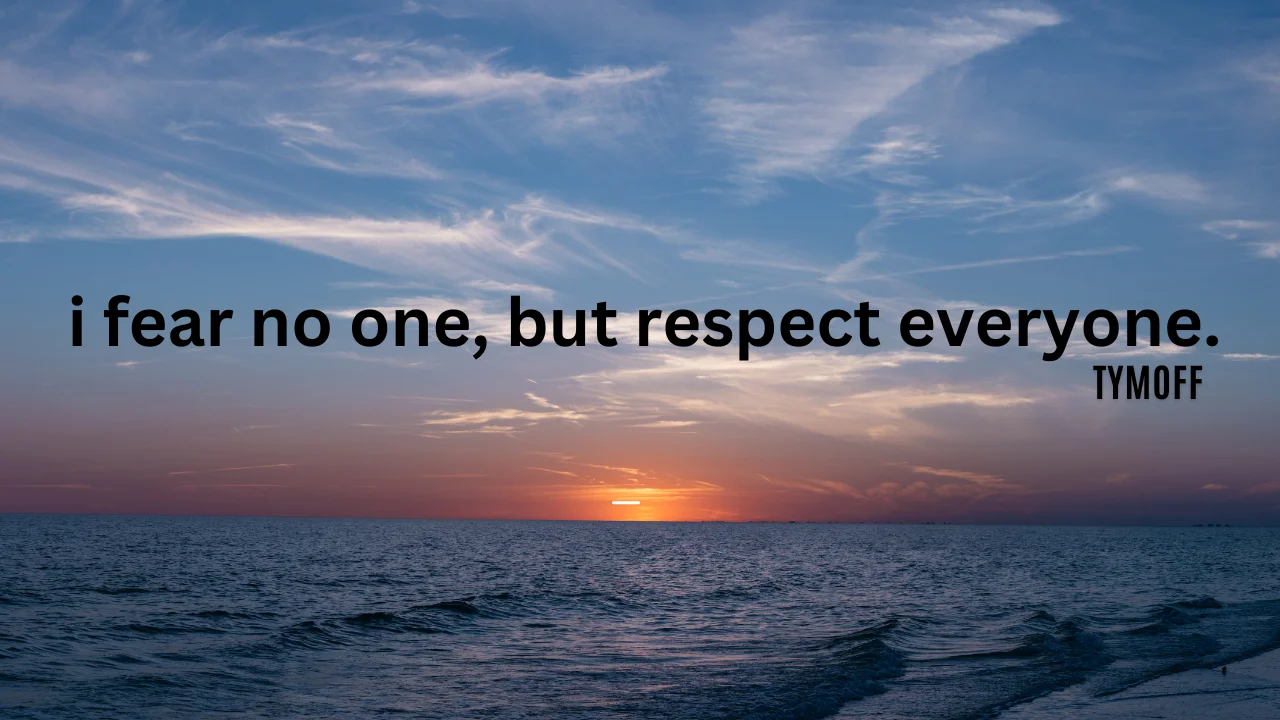Introduction
The phrase “I fear no one, but respect everyone. – Tymoff” encapsulates a powerful and balanced approach to life. It suggests a harmonious blend of confidence and humility, encouraging individuals to navigate their lives with both fearlessness and respect. This article delves into the significance of this philosophy, exploring its roots, practical applications, and the impact it can have on personal and professional development.
Understanding the Philosophy
“I fear no one, but respect everyone. – Tymoff” is more than just a statement; it is a guiding principle that emphasizes the importance of overcoming fear while maintaining respect for others. At its core, this philosophy advocates for self-assuredness and the recognition of others’ worth, creating a balanced approach to interactions and personal growth.
Philosophical Roots
The concept of fearing no one while respecting everyone is deeply rooted in various philosophical traditions. In Stoicism, for instance, fearlessness is linked to understanding and accepting what is beyond our control, while respect is seen as a virtue that fosters harmonious relationships. Similarly, Confucianism emphasizes respect for others as a cornerstone of a well-ordered society.
The Essence of Fearlessness
To fully grasp “I fear no one, but respect everyone. – Tymoff,” one must understand the essence of fearlessness. Fearlessness is not about the absence of fear but about mastering it. It involves confronting challenges head-on and not allowing fear to dictate one’s actions. Leaders who embody this trait often inspire others through their courage and resilience.
Case Studies of Fearlessness
Examining historical and contemporary figures who embody this principle can provide valuable insights. For instance, leaders like Nelson Mandela and Malala Yousafzai have demonstrated remarkable fearlessness in their pursuits, while maintaining deep respect for their adversaries and allies alike.
The Role of Respect
Respect is a fundamental aspect of “I fear no one, but respect everyone. – Tymoff.” It involves recognizing the inherent dignity of every individual, regardless of their status or actions. Respect fosters positive interactions and builds trust, creating a supportive environment for personal and professional growth.
Cultural Perspectives on Respect
Different cultures interpret and practice respect in varied ways. In Japan, respect is deeply ingrained in social interactions, while in Western cultures, it is often expressed through equality and fairness. Understanding these perspectives can enhance one’s ability to apply “I fear no one, but respect everyone. – Tymoff” in diverse contexts.
Balancing Fearlessness and Respect
Striking a balance between fearlessness and respect can be challenging. It requires acknowledging one’s strengths and limitations while valuing others’ contributions. Misconceptions about fearlessness and respect can lead to conflicts or misunderstandings, but with mindfulness and self-awareness, it is possible to harmonize these traits effectively.
Practical Strategies
Implementing the philosophy of “I fear no one, but respect everyone. – Tymoff” involves several strategies:
- Developing Fearlessness: Engage in activities that push your boundaries and build confidence.
- Cultivating Respect: Practice active listening and empathy in your interactions with others.
- Maintaining Balance: Reflect on your actions and seek feedback to ensure you are upholding both fearlessness and respect.
Overcoming Challenges
Navigating challenges while adhering to “I fear no one, but respect everyone. – Tymoff” requires resilience and adaptability. Difficult situations may test your ability to balance fearlessness with respect, but approaching these challenges with a clear mindset can lead to constructive outcomes.
Real-Life Scenarios
Consider a workplace conflict where you must stand up for your beliefs while remaining respectful of differing opinions. By applying “I fear no one, but respect everyone. – Tymoff,” you can address the issue assertively yet diplomatically, fostering a collaborative environment.
Expert Opinions
Insights from psychologists and leadership experts highlight the benefits of integrating “I fear no one, but respect everyone. – Tymoff” into daily life. Experts suggest that this philosophy promotes emotional intelligence, enhances leadership qualities, and improves interpersonal relationships.
Quotes from Influential Figures
Influential figures such as Mahatma Gandhi and Martin Luther King Jr. have exemplified the essence of “I fear no one, but respect everyone. – Tymoff” through their actions and teachings. Their experiences offer valuable lessons on embodying both fearlessness and respect.
Visual and Interactive Elements
To better understand “I fear no one, but respect everyone. – Tymoff,” visual aids such as infographics and interactive tools can be helpful. Infographics can illustrate the balance between fearlessness and respect, while interactive tools can offer self-assessment quizzes to gauge your alignment with this philosophy.
Conclusion
In summary, “I fear no one, but respect everyone. – Tymoff” offers a profound framework for personal and professional development. By embracing this philosophy, individuals can navigate their lives with confidence and courtesy, creating a positive impact on themselves and those around them.
FAQs
1. What does the phrase mean?
It signifies being bold in the face of challenges while treating others with respect.
2. How can I apply it daily?
Approach challenges with confidence and engage with others respectfully.
3. What are the benefits?
Enhanced self-esteem, better relationships, and a positive social impact.
4. How does fearlessness relate to respect?
Fearlessness is about overcoming personal fears, while respect is about valuing others.
5. Who embodies this philosophy?
Figures like Nelson Mandela and Malala Yousafzai exemplify this balance.
6. How to balance fearlessness and respect?
Be assertive and confident, but always considerate of others’ viewpoints.
7. How can I measure its impact?
Observe changes in your personal growth and relationships.
8. Where to learn more?
Explore resources on leadership and personal development for deeper insights.
Appendix
Glossary of Key Terms
- Fearlessness: The quality of being unafraid or undaunted.
- Respect: A feeling of deep admiration for someone or something.
Additional Case Studies
- Nelson Mandela: A leader who demonstrated fearlessness and respect.
- Malala Yousafzai: An advocate who balances courage with respect for diverse perspectives.
References and Citations
- List of sources and further reading materials related to the philosophy of “I fear no one, but respect everyone. – Tymoff.”





















+ There are no comments
Add yours